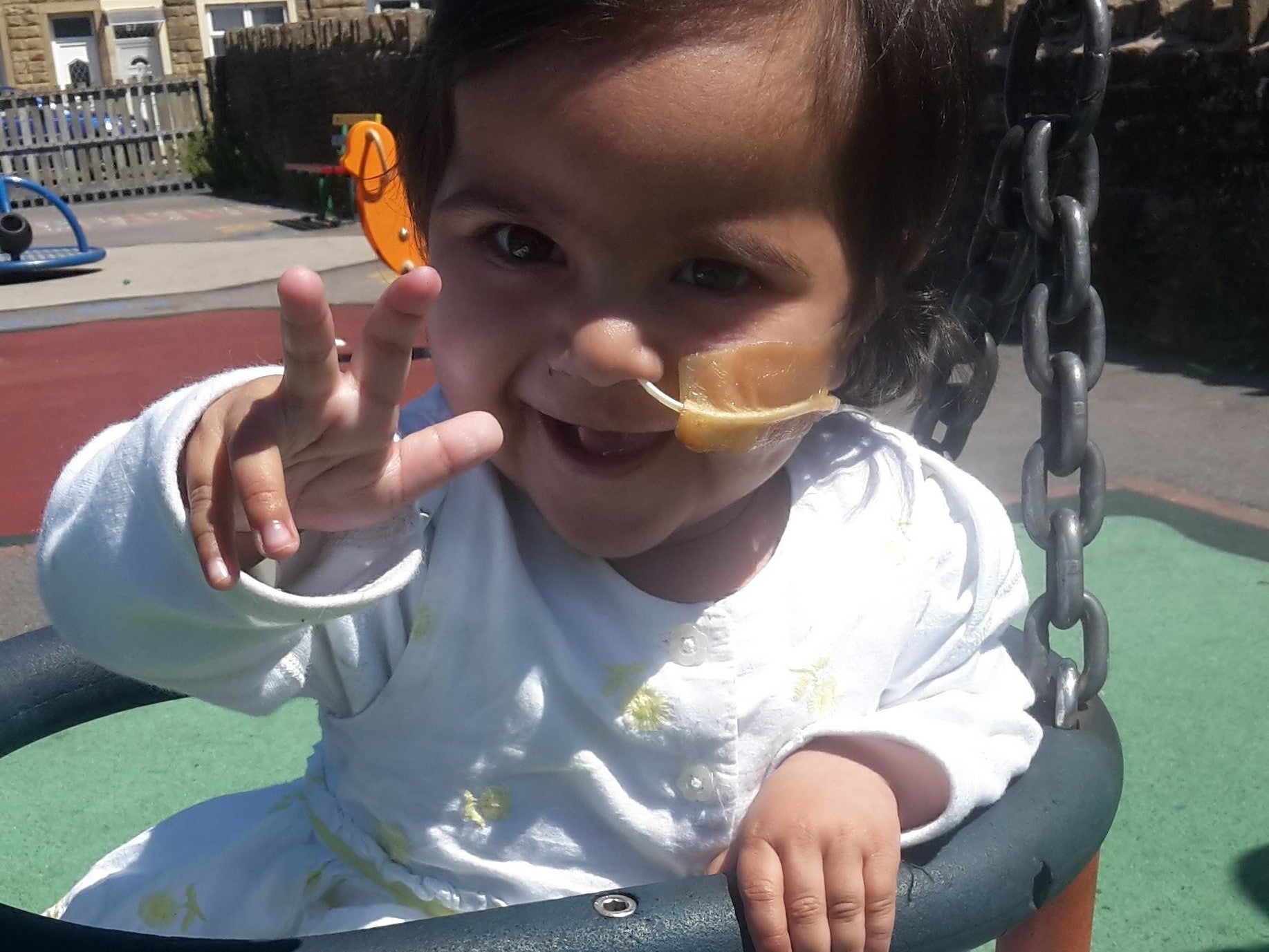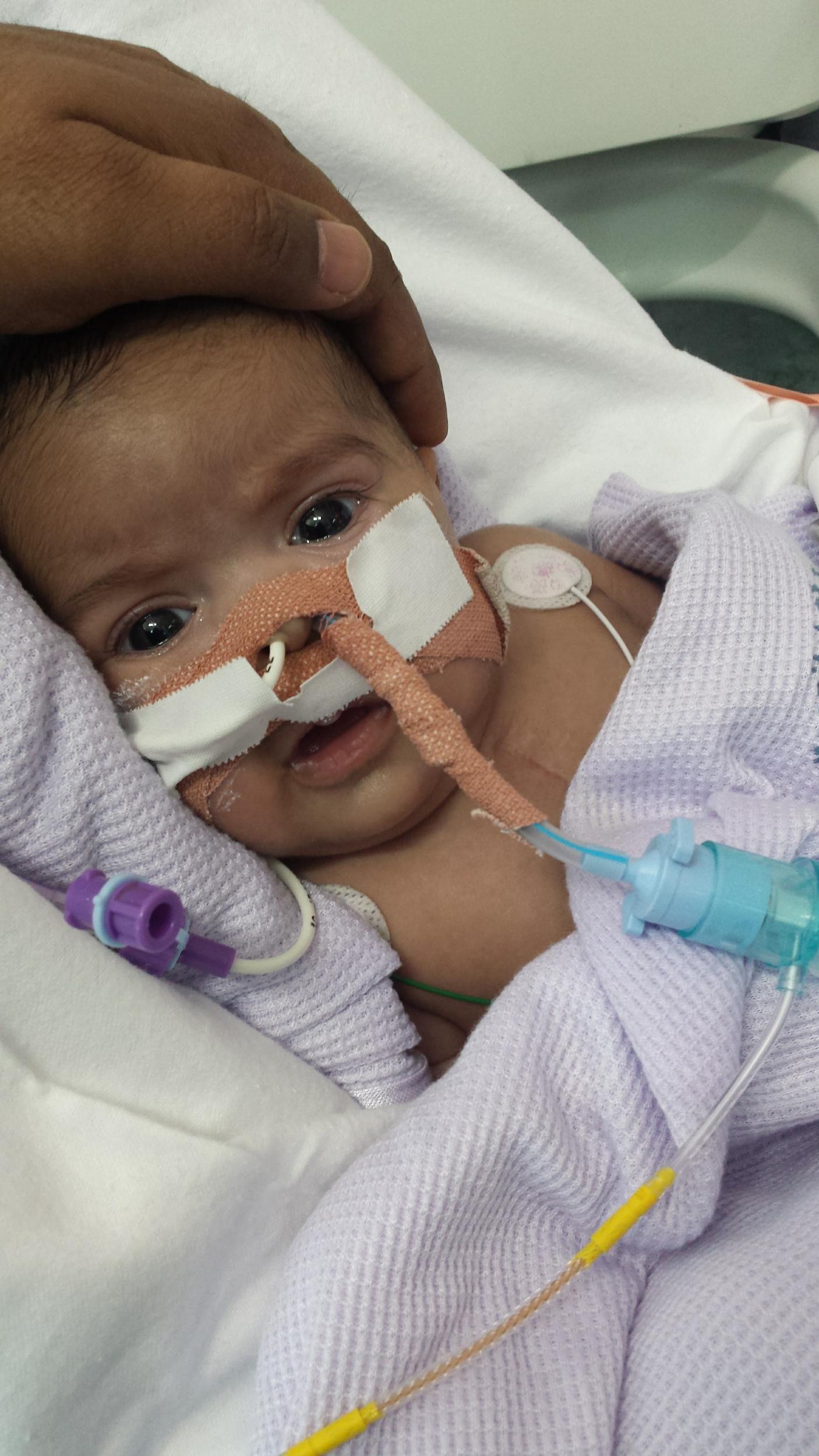Father claims NHS did unnecessary open heart surgery on daughter who had colic
Exclusive: ‘They achieved nothing, damaged her lungs and her brain slightly’

Your support helps us to tell the story
From reproductive rights to climate change to Big Tech, The Independent is on the ground when the story is developing. Whether it's investigating the financials of Elon Musk's pro-Trump PAC or producing our latest documentary, 'The A Word', which shines a light on the American women fighting for reproductive rights, we know how important it is to parse out the facts from the messaging.
At such a critical moment in US history, we need reporters on the ground. Your donation allows us to keep sending journalists to speak to both sides of the story.
The Independent is trusted by Americans across the entire political spectrum. And unlike many other quality news outlets, we choose not to lock Americans out of our reporting and analysis with paywalls. We believe quality journalism should be available to everyone, paid for by those who can afford it.
Your support makes all the difference.A father who claims unnecessary heart surgery left his daughter with brain damage is calling on the health secretary to launch an inquiry.
Gazanfer Ali believes medics at Birmingham Women’s and Children’s (BWC) NHS Foundation Trust overreacted to a common case of colic – prolonged crying – because his daughter, Imaan, was born with a heart condition.
He claims her lungs have been damaged by the operation, which was undertaken to increase blood flow from the heart, and that parts of her brain were starved of oxygen in a second procedure to reduce blood flow.
While he consented to the emergency procedure, Mr Ali said he was in an emotional state at the time, and he and his wife had been given two hours’ notice.
“I have to live with the guilt around the decisions I let this hospital make,” Mr Ali told The Independent, and added that the stress caused him to quit his job and has prevented him sleeping.
These concerns are the subject of an ongoing complaint. However, BWC said it took appropriate action based on the information it had available.
At Mr Ali’s request, the surgical decision-making and notes relating to Imaan’s care have been reviewed by Alder Hey Children’s Hospital, which did not find fault with the original care. BWC said it has also not had any concerns raised by Great Ormond Street Hospital, into whose care she was transferred.
Dr Fiona Reynolds, chief medical officer at Birmingham Women’s and Children’s NHS Foundation Trust, said: “In this case, the trust conducted a thorough review, led by an experienced consultant surgeon who was not involved directly in Imaan’s care and, at the request of Mr Ali, sought the opinion of an independent paediatric cardiologist and paediatric cardiac surgeon from another specialist cardiac centre.
“The conclusion of these investigations was that the decision taken by our teams to perform surgery was absolutely correct, and that still remains the case today with the benefit of hindsight.”
Imaan was born with a heart defect that affects the blood flowing to her lungs to oxygenate her body – often known as a blue baby. In some cases this defect automatically requires surgery or medication to increase the blood flow to the lungs, while in other cases the child will be kept under observation to see if they are getting sufficient blood supply from other vessels.
After a two-week stay in hospital, Imaan’s parents had been told they would be able to go home in two days’ time, when doctors reviewing her charts over the weekend noticed her oxygen levels had been dropping periodically.
Mr Ali maintains that these drops were due to her crying heavily at night, and the sudden change began after staff encouraged switching her from bottle to breastfeeding. He told The Independent that nursing staff had recorded in their notes that Imaan was struggling to feed, but said doctors didn’t consider this.

“The cardiac consultants concentrated on the heart, nurses saw my daughter was developing symptoms [of not getting enough feed], but the two have completely not communicated,” he said.
“The consultants said she’s obviously deteriorating, we need to do open heart surgery to put in a conduit for extra blood flow to the lungs.
“It didn’t sound right… I was in an emotional state thinking I was meant to be going home this day, now I’m having to sign a document which I really don’t want to when we only discussed it at half eight in the morning.”
After the surgery Imaan continued to cry and show deterioration in her oxygen levels, until 12 days later she went into major respiratory distress and had to be moved to intensive care. A blood transfusion was also delayed by several hours.
“My daughter was about to die right there, it felt like her soul was leaving her body,” Mr Ali said, and while sepsis was recorded in Imaan’s notes he blames “medical professionals not acting quick enough or listening to my concerns”.
Imaan’s crying continued in the paediatric intensive care unit, and only stopped when she was prescribed a colic remedy – though there are no universal fixes for colic.
After nearly two months the family said Imaan “looked much better”, but the hospital revealed she would need a final procedure because she may now be getting too much blood flow to her lungs.
Mr Ali maintains this was a “coverup” for the first unnecessary procedure as they had to close her original artery and enlarge the conduit they had put in place. This is strongly denied by Birmingham Children’s Hospital, which pointed out this had not been raised as a potential issue in Alder Hey’s review.
“Had I gone to a different hospital then, they might have said, ‘Why would you do the first procedure, her artery seems normal?’,” Mr Ali said.
Two years on Imaan is being fed on a nasogastric tube, and her oxygen levels still dip when she cries.
“They achieved nothing, damaged her lungs and her brain slightly,” Mr Ali said. “Birmingham told me at two to three years old we’ll monitor how she’s progressing. As a baby you can’t tell what the development issues will be, but she’s got no movement, she can’t do normal things like other children.”
While the hospital was rated “outstanding” at its last inspection by the Care Quality Commission, parents who have lost children on the cardiology ward have previously raised concerns about how their concerns were handled.
At an inquest in 2012, Paula Stevenson, whose daughter Hayley Fullerton died in 2009 after heart surgery, claimed staff did not listen to family members’ concerns and a coroner recorded serious failings.
In 2017 an inquest found staff failed to spot a rare heart condition had contributed to the death of nine-month-old Sada Hamza. Her mother, Sakar Hussein, said her concerns were not taken seriously. “They made me feel she’s OK, and I did believe them,” she told the BBC.
Mr Ali said he feels there are parallels in his case which he wants to discuss with the government.
“I want to speak to the MPs, face to face,” he said. “These are serious issues and I don’t want any other baby to go through what my daughter has,” he said.
The trust said it will continue to work with Mr Ali to resolve his complaint and that it would “welcome” a review by the independent Parliamentary and Health Service Ombudsman.
Join our commenting forum
Join thought-provoking conversations, follow other Independent readers and see their replies
Comments